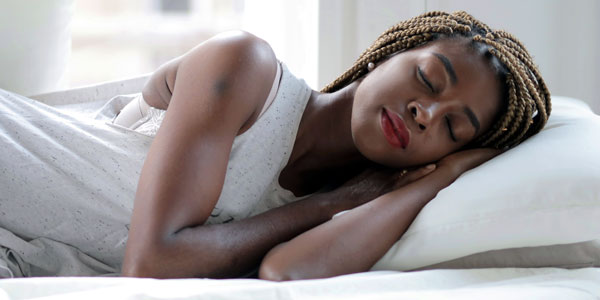
Save you sanity with sleep
- Beth Amato
Lack of sleep can wreak havoc on your physical health and mental wellbeing – and may have implications for people living with HIV.
Famed writer Virginia Woolf wrote of sleep as “that deplorable curtailment of the joy of life”. This, however, couldn’t be further from the truth. Quality sleep is critical for sound mental health and a strong immune system, likely cornerstones of a joyful life.
Sleepy, Dopey, Grumpy
Sleep deprivation is associated with a higher risk of developing depression. One bad night’s sleep may not do it, but if you’re out on the town or working late every night, believing sleep is for the dead and boring, your happiness declines exponentially.
Even acute sleep deprivation in those with common mental illnesses, like bipolar mood disorder or clinical depression, is known to precipitate a manic or depressive phase, says Dr Karine Scheuermaier of the Wits Sleep Laboratory.
“If one does not get enough sleep, acute symptoms include mood alterations, irritability, decreased enthusiasm, and a decreased capacity to learn,” she says. “A good night’s sleep is critical for road and occupational safety. Without sleep, reactions are slowed and on South African roads, where motor vehicle accidents are high, it is almost a civic duty to get enough sleep.”
Sleep acts to free-up ‘space’ in our mental hard drives by deleting unnecessary ‘connections’ that our overactive brains make while we are awake. “A person who regularly sleeps less than six hours a night may ‘feel’ alright, but if tested, would show cognitive impairment and decreased motor performance,” says Scheuermaier.
It is not only diminished mental capacity that is synonymous with sleep deprivation. Poor sleep quality or low sleep duration can also lead to higher blood pressure, a higher risk of developing insulin resistance, diabetes, compromised cardiovascular functioning, auto-immune disorders and a higher sensitivity to pain.

Sleeping like a baby
If there is one great leveller, it is the lack of sleep involved in caring for a young baby. Some parents can’t wait to leap into sometimes draconian sleep training schedules as soon as the baby is old enough, or hire someone, if they’re lucky, to help at night.
“Co-sleeping is an effective way to improve both a baby and mother’s sleep,” says Scheuermaier, but it isn’t widely practised. “In France, there is the idea that you can sleep train a baby from three-months-old, which to some is outrageous. However, it is possible for children to develop circadian rhythms after three months. So, sleep consolidation is possible.” Circadian rhythms refer to the physical, mental, and behavioural changes that follow a daily cycle – such as sleeping when it is dark and being awake when it is light.
To nap or not to nap
The jury is out on the benefits of 40 winks. Taking a long afternoon nap, a cultural cornerstone in southern Europe, may not be the wisest decision. A short power nap (no longer than 20 minutes) is only useful for those who did not get a good night’s sleep the night before, as a short nap has been shown to restore cognitive function. However, it is not necessary with proper sleep hygiene – which means you keep regular sleeping hours each night, take appropriate nutrition during the day, and go to bed and wake up at the same time.
In people who do not have sleep disorders, a long nap reduces the build-up of sleep pressure during the day and therefore will push bedtime later. If the person needs to wake up at the same time the following day, they will then sleep for less time, which may lead them to feel tired during the day and take a nap, which sets up a cycle of poor sleep.
“A longer nap may be more a sign of an underlying sleep disorder, such as sleep apnoea or Periodic Limb Movement Disorder or, more rarely, narcolepsy,” says Scheuermaier. People may not always be aware that they have apnoea, but their partners may notice them gasping for breath while asleep or snoring loudly. In narcolepsy, people spontaneously fall asleep during the day and may have images from dreams appear, although these are termed hypnagognic hallucinations, because the person is aware that the images are not real.
Sleep patterns in people with HIV
The Wits Sleep Laboratory has been doing a longitudinal study in Soweto, looking at sleep patterns in a population living with HIV. “We found that low sleep quality in people living with HIV was associated with pain, depression and higher CD4 counts. This led us to hypothesise that maybe the lower sleep quality observed in people living with HIV, even when treated, may be caused by a chronic immune activation and conversely, that the chronic immune activation may be exacerbated by sleep issues,” says Scheuermaier.
The team is now collecting sleep data on people living with HIV and people who are HIV negative to further explore this hypothesis. Part of this study is being run in Limpopo and has since 2015 followed 850 people living with HIV and 1 100 controls. The other part of this study, in Mpumalanga, is a collaboration with Professor Xavier Gomez-Olive from the Wits School of Public Health and Professor Malcolm von Schantz, from the University of Surrey, UK.
- Beth Amato is a freelance writer.
- This article first appeared in Curiosity, a research magazine produced by Wits Communications and the Research Office.
- Read more in the 10th issue, themed: #Mood how our mental health and wellbeing are impacted by the socio-economic, political, psychological, legal, ethical, cultural and technological interpretations of our world.

